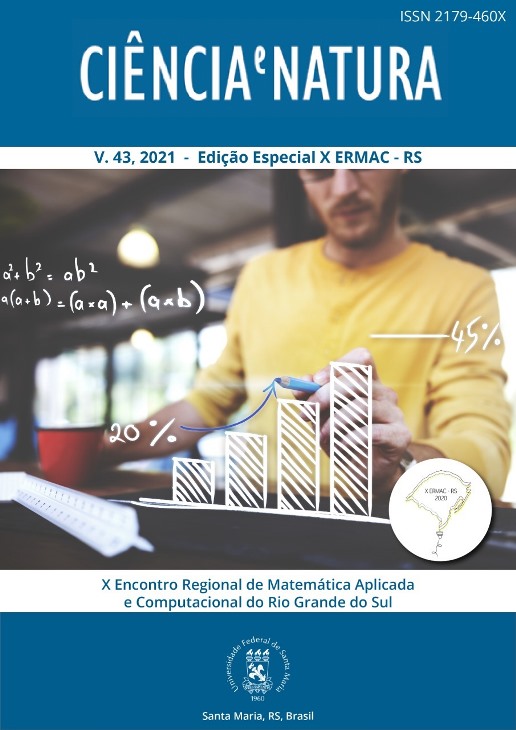Análise da Pandemia de COVID-19 em Pelotas
DOI:
https://doi.org/10.5902/2179460X66994Palavras-chave:
COVID-19, Modelos epidemiológicos, Modelagem matemáticaResumo
Neste trabalho apresenta-se uma análise da situação dos casos de contaminação da população pelo virus SARS-CoV-2, durante a pandemia de COVID-19, na cidade de Pelotas, no sul do Rio Grande do Sul.Utilizando um modelo matemático do tipo compartimentado simples e determinístico, apresenta-se uma projeção do número de casos até o final do ano de 2020, considerando 3 diferentes cenários. A evolução da pandemia considerando curvas de casos acumulados, recuperados, ativos e óbitos; a ocupação dos leitos de UTI exclusivos COVID; casos e óbitos por semana epidemiológica e a variação do número efetivo de reprodução e do percentual de isolamento social em Pelotas, também será apresentado.
Downloads
Referências
Cori, A. Ferguson, N. M., Fraser, C. and Cauchemez, S. A. New framework and software to estimate time-varying reproduction numbers during epididemics. American Journal of Epidemiology. 2013, V. 178, pg. 1505-1512
Kermack, W. and Mckendrick, A. Contributions to the matehmatical thoeory of epidemics-I. Bulletin of Mathematical Biology. 1991, V. 53, pg. 33-55.
Kermack, W. and Mckendrick, A. Contributions to the matehmatical thoeory of epidemics-II. The problem of edemecity. Bulletin of Mathematical Biology. 1991, V. 53, pg. 57-87.
Kermack, W. and Mckendrick, A. Contributions to the matehmatical thoeory of epidemics-III. Further studies of the problem of endemicity. Bulletin of Mathematical Biology. 1991, V. 53, pg. 89-118.
Delamater, P. L., Street, E. J., Leslie, T. F., Yang, Y. T. and Jacobsen, K. H. Complexity of the basic reproduction number (R0).American Association for the advancement of Science. 2019, V.25, pg. 1-4.
Downloads
Publicado
Versões
- 2022-07-14 (2)
- 2021-11-08 (1)
Como Citar
Edição
Seção
Licença
Para acessar a DECLARAÇÃO DE ORIGINALIDADE E EXCLUSIVIDADE E CESSÃO DE DIREITOS AUTORAIS clique aqui.
Diretrizes Éticas para Publicação de Revistas
A revista Ciência e Natura está empenhada em garantir a ética na publicação e na qualidade dos artigos.
A conformidade com padrões de comportamento ético é, portanto, esperada de todas as partes envolvidas: Autores, Editores e Revisores.
Em particular,
Autores: Os Autores devem apresentar uma discussão objetiva sobre a importância do trabalho de pesquisa, bem como detalhes e referências suficientes para permitir que outros reproduzam as experiências. Declarações fraudulentas ou intencionalmente incorretas constituem comportamento antiético e são inaceitáveis. Artigos de Revisão também devem ser objetivos, abrangentes e relatos precisos do estado da arte. Os Autores devem assegurar que seu trabalho é uma obra totalmente original, e se o trabalho e / ou palavras de outros têm sido utilizadas, isso tem sido devidamente reconhecido. O plágio em todas as suas formas constitui um comportamento publicitário não ético e é inaceitável. Submeter o mesmo manuscrito a mais de um jornal simultaneamente constitui um comportamento publicitário não ético e é inaceitável. Os Autores não devem submeter artigos que descrevam essencialmente a mesma pesquisa a mais de uma revista. O Autor correspondente deve garantir que haja um consenso total de todos os Co-autores na aprovação da versão final do artigo e sua submissão para publicação.
Editores: Os Editores devem avaliar manuscritos exclusivamente com base no seu mérito acadêmico. Um Editor não deve usar informações não publicadas na própria pesquisa do Editor sem o consentimento expresso por escrito do Autor. Os Editores devem tomar medidas de resposta razoável quando tiverem sido apresentadas queixas éticas relativas a um manuscrito submetido ou publicado.
Revisores: Todos os manuscritos recebidos para revisão devem ser tratados como documentos confidenciais. As informações ou ideias privilegiadas obtidas através da análise por pares devem ser mantidas confidenciais e não utilizadas para vantagens pessoais. As revisões devem ser conduzidas objetivamente e as observações devem ser formuladas claramente com argumentos de apoio, de modo que os Autores possam usá-los para melhorar o artigo. Qualquer Revisor selecionado que se sinta desqualificado para rever a pesquisa relatada em um manuscrito ou sabe que sua rápida revisão será impossível deve notificar o Editor e desculpar-se do processo de revisão. Os Revisores não devem considerar manuscritos nos quais tenham conflitos de interesse resultantes de relacionamentos ou conexões competitivas, colaborativas ou outras conexões com qualquer dos autores, empresas ou instituições conectadas aos documentos.






